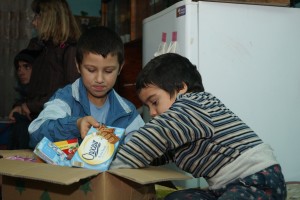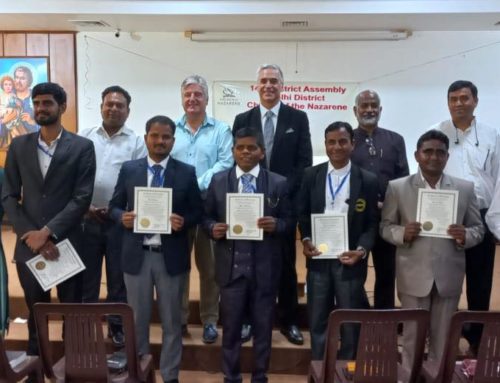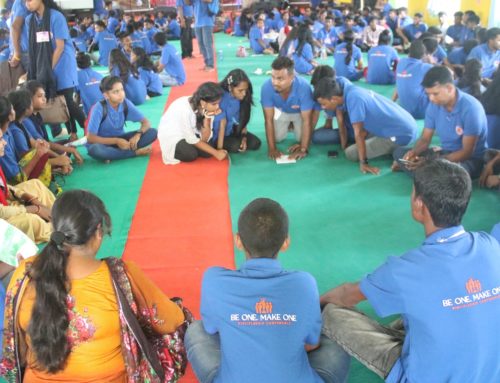 “Thank you so much for this Christmas parcel – but thank you even more for you!” Juliana, sitting on the edge of her bed in her one-room apartment, smiles at us. “I will pray for you – you are more precious than this present!” She indicates the brown package balanced on top of a drawer which she knows contains a number of good things: coffee, chocolate, hand lotion and a variety of other food and hygiene items that she would never be able to afford with her meager pension. Then she points at the Helping Hands employees that visited her two years ago. “I remember you, and I’ve been praying for you ever since you came! This package you bring, it’s from Jesus Christ. May God bless you!”
“Thank you so much for this Christmas parcel – but thank you even more for you!” Juliana, sitting on the edge of her bed in her one-room apartment, smiles at us. “I will pray for you – you are more precious than this present!” She indicates the brown package balanced on top of a drawer which she knows contains a number of good things: coffee, chocolate, hand lotion and a variety of other food and hygiene items that she would never be able to afford with her meager pension. Then she points at the Helping Hands employees that visited her two years ago. “I remember you, and I’ve been praying for you ever since you came! This package you bring, it’s from Jesus Christ. May God bless you!”
Juliana is one of a few dozen elderly people that the Sighişoara-based Veritas foundation, which grew out of Nazarene ministry in Romania, ministers to. Some attend “elderly clubs” that meet in different locations across the town several times each week. Others, like Juliana, are too frail to go to club meetings and are regularly visited by Veritas staff who bring them lunch every second day, spend time with them, arrange doctor visits, listen to their stories. It is a simple ministry, but makes an enormous difference for these people who are neglected by society, lonely and in need. Every sign of love and care is accepted with an overwhelming gratitude: like the Christmas parcels, that every member of the elderly clubs and house-bound elderly connected with the Veritas foundation receives: a token of love at Christmas.
For many years now, Helping Hands Germany has been sending Christmas parcels to Eastern Europe. The parcels contain food and hygiene items and are given to people connected with Nazarene ministries in Vidrare, Bulgaria, and surrounding villages, as well as Bucharest and Sighişoara, Ţigmandru, Viscri and Buneşti in Romania. This year, the “Christmas shipment” included 864 Christmas parcels that had been packed by individuals, families and groups all over Germany. Two Helping Hands employees and three volunteers were able to travel to Romania in December to join the distribution.
Many of the recipients in Bulgaria and Romania are elderly people who survive on a very small pension and can often barely afford essential food items or fuel for heating. But there are also many needy families with children who are grateful to receive a parcel with good things to cheer up their Christmas celebration. Some of these live in a Roma community at the outskirts of Sighişoara, where we visit after we have taken leave of the elderly.
When we arrive, we are immediately surrounded by children asking for their picture to be taken, grabbing hands, dancing through the muddy street. A few of them are holding tiles to their ears and talk excitedly – imitation smart phones: poverty is creative. It is almost dark and the abject poverty and poor sanitation in the community is not as visible as during the day. A young couple walks past – the girl, clearly pregnant, looks as if she is about eleven years old.
We knock on doors, evade dogs, hand out parcels and watch worry dissolve into joy as people accept this gift of love at Christmas. It is astonishing to see what happiness can be found in places that, seeing them, make us want to weep. We visit a family who, two years ago, was in despair about a parent’s near-fatal injury. Today, only laughing faces meet us in this home, and the little sad-faced girl we remember from before is now a beaming whirlwind of Christmas cheer. As we turn to leave, we can see her taking the parcel into her arms, dancing with it in a circle and laughing happily. It is a simple ministry – just a brown package with food and hygiene articles. But for the people who receive the Christmas parcels, they make an enormous difference: the difference between being forgotten and being loved.



